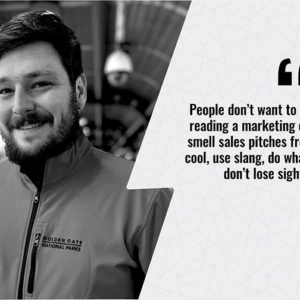- There are always more deals than the one that you are looking at right now. Walking away is the first step in finding them.
- Mean people suck the inspiration out of you. Avoid them at all costs — especially if one of them is your boss.
- Selling is the only way to grow your business. If you’re not selling something, you are about to lose everything.
- Employees are your biggest asset. Take your time deciding who to invest in — and then invest for long-term return.
- The details don’t need to matter to you, but they do need to matter to someone you trust — or you’ll fail.
- Tone of voice matters more than what you say. So does eye contact and a firm handshake.
- It’s not the plan that gets broken. It’s people. Heal people to fix the plan.
- Stop being cheap. Invest in your success. The truth is that no one else is.
- It’s what you are willing to do without that decides how committed you are to being successful.
- If you’re not different, you’re not really a choice for your customers. You’re just part of the confusion.
- Pay your bills ahead of schedule. You’ll find it easier to manage your cash flow. And your vendors.
- The experts have an opinion. So do you. Believe yours first and then keep working until everyone else has to believe you too.
- Better isn’t good enough. You have to want to be amazing. And then do what it takes to achieve that.
- If you haven’t had to cry because you cared, maybe you need to care more.
- Mentor employees who want to be better. Ignore the hotheads. They’re too arrogant to be helped.
- When things get bad, take time to think of others. Helping others helps you.
- Cold calling still works. So does email. It’s the message that matters — not what device you choose to use.
- Having a plan is the way to get started. Having a dream is the way you keep going.
- Stop celebrating so much. That’s a sign of mediocrity. Act like you’ve been there before.
- The next best thing to doing something amazing is not doing something stupid, selfish, or lazy.
- Apologize when you make a mistake. It makes you human — it also earns you the good will you’ll need soon enough.
- Your logic doesn’t matter when your clients are already emotional.
- Customers need a dream. Give them one. Not speeds-and-feeds. (They’ll be loyal to you for life.)
- The difference between winning and losing is when you stop trying. Quit quitting.
- Leading doesn’t give you permission to be a bully or a jerk. Have a dream and work to make it reality.
- Bad news gets worse the longer you avoid communicating it with your customer.
- You can cut costs. But you can’t cut your way to more sales. You have to invest in your success.
- If you’re not radically different, you’re really not different at all.
- There is never enough time to redo all the things you should have done better the first time.
- Emotional intelligence is the best kind of intelligence to have. Care about people. They’ll care about you back.
- Reminding people of all the things you do right isn’t a winning strategy for fixing the stuff you do wrong.
- Winning over everybody is the wrong goal. It’s also impossible.
- Play it risky. Go for broke. You’re only alive once. Plus, the rewards are bigger.
- Kindness is your best investment. It’s also your biggest challenge when you’re busy and stressed out.
- Being good isn’t the goal. Being absolutely amazing is.
- No one has ever achieved anything amazing by working smarter. Realizing your dreams is about working harder.

It’s On You To Get What You Want From Life
You are responsible for your actions. Completely responsible. There is never a time when you are not responsible for what you do, what you think,




